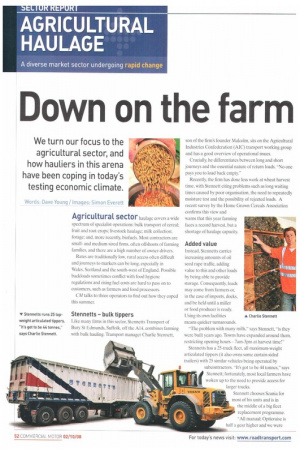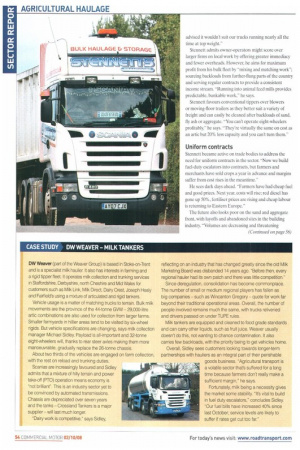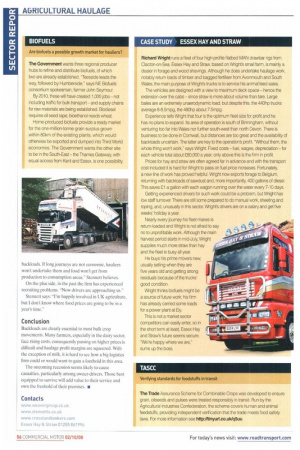own on the farm
Page 52

Page 54

Page 56

If you've noticed an error in this article please click here to report it so we can fix it.
We turn our focus to the agricultural sector, and how hauliers in this arena have been coping in today's testing economic climate.
Words: Dave Young / Images: Simon Everett
Agricultural sector haulagccovers a wide spectrum of specialist operations: bulk transport of cereal; fruit and root crops: livestock haulage; milk collection; forage; and, more recently, biofuels. Most contractors are smalland medium-sized firms, often offshoots of farming families, and there are a high number of owner-drivers.
Rates are traditionally low, rural access often difficult and journeys to markets can be long, especially in Wales. Scotland and the south-west of England. Possible backloads sometimes conflict with food hygiene regulations and rising fuel costs are hard to pass on to customers, such as farmers and food processors.
CM talks to three operators to find out how they coped this summer.
Stennetts bulk tippers
Like many firms in this sector, Stennetts Transport of Bury St Edmunds, Suffolk, off the A14, combines farming with bulk hauling. Transport manager Charlie Stennett, son of the firm's founder Malcolm, sits on the Agricultural Industries Confederation (MC) transport working group and has a good overview of operational issues.
Crucially, he differentiates between long and short journeys and the essential nature of return loads. "No one pays you to load back empty."
Recently, the firm has done less work at wheat harvest time, with Stennett citing problems such as long waiting times caused by poor organisation, the need to repeatedly moisture test and the possibility of rejected loads. A recent survey by the Home Grown Cereals Association confirms this view and warns that this year farming faces a record harvest, but a shortage of haulage capacity.
Added value
Instead, Stennetts carries increasing amounts of oil seed rape traffic, adding value to this and other loads by being able to provide storage. Consequently, loads may come from farmers or, in the case of imports, docks, and be held until a miller or food producer is ready. Using its own facilities means quicker turnarounds.
"The problem with many mills," says Stennett, "is they were built years ago. Towns have expanded around them, restricting opening hours 7am-3pm at harvest time!
Stennetts has a 25-truck fleet, all maximum-weight articulated tippers (it also owns some curtain-sided trailers) with 25 similar vehicles being operated by subcontractors. it's got to be 44 tonnes," says iStennett; fortunately, most local farmers have woken up to the need to provide access for larger trucks.
Stennett chooses Scania for most of his units and is in the middle of a big fleet replacement programme. -All manual; Opticruise is half a gear higher and we were advised it wouldn't suit our trucks running nearly all the time at top weight."
Stennett admits owner-operators might score over larger firms on local work by offering greater immediacy and fewer overheads. However, he aims for maximum profit from his bulk fleet by "mixing and matching work"; sourcing backloads from further-flung parts of the country and serving regular contracts to provide a consistent income stream. "Running into animal feed mills provides predictable, bankable work," he says.
Stennett favours conventional tippers over blowers or moving-floor trailers as they better suit a variety of freight and can easily be cleaned after backloads of sand, fly ash or aggregate. -You can't operate eight-wheelers profitably." he says. "They're virtually the same on cost as an artic but 20% less capacity and you can't turn them."
Uniform contracts
Stennett became active on trade bodies to address the need for uniform contracts in the sector. "Now we build fuel-duty escalators into contracts, but farmers and merchants have sold crops a year in advance and margins suffer from cost rises in the meantime."
He sees dark days ahead. "Farmers have had cheap fuel and good prices. Next year, costs will rise; red diesel has gone up 50%, fertiliser prices are rising and cheap labour is returning to Eastern Europe."
The future also looks poor on the sand and aggregate front, with layoffs and abandoned sites in the building industry. "Volumes are decreasing and threatening
backloads. If long journeys are not economic, hauliers won't undertake them and food won't get from production to consumption areas," Stennett believes.
On the plus side, in the past the firm has experienced recruiting problems. "Now drivers are approaching us."
Stennett says: "I'm happily involved in UK agriculture, but I don't know where food prices are going to be in a year's time."
Conclusion
Backloads are clearly essential to most hulk crop movements. Many farmers, especially in the dairy sector, face rising costs, consequently passing on higher prices is difficult and haulage profit margins are squeezed. With the exception of milk, it is hard to see how a big logistics firm could or would want to gain a foothold in this area.
The oncoming recession seems likely to cause casualties, particularly among owner-drivers. Those best equipped to survive will add value to their service and own the freehold of their premises. •
Contacts
www.weavergroup.co.uk www.stennetts.co.uk
www.crosstandtankers,com Essex Hay & Straw 01255 861996




































































































































































